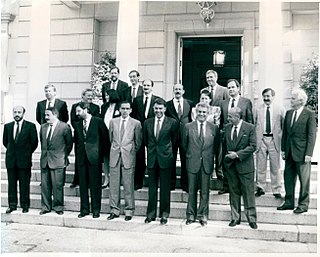Related Research Articles
An impi is a Zulu regiment.

Mexico uses four time zones:

The Mexican Space Agency is the national space agency of Mexico, established in July 2010. The agency does not have infrastructure, and aims to promote and coordinate education, research and development of the space-related activities that are performed in the country.

The Ministry of Culture and Sport (MCD) is the department of the Government of Spain responsible for the promotion, protection and dissemination of the Spanish historical heritage, national museums, art, books, reading and literary creation, of cinematographic and audiovisual activities and of national archives and libraries.
INPI may refer to:

The Mexican Petroleum Institute is a public research organization dedicated to develop technical solutions, conduct basic and applied research and provide specialized training to Pemex, the state-owned government-granted monopoly in Mexico's petroleum industry.
Olinalá is a city and seat of the municipality of Olinalá, in the state of Guerrero, south-western Mexico. It is well known throughout the country for its crafts, called Lacas de Olinalá.
Industrial property law in Mexico has been changing in order to be updated with the international tendencies. The process of integration in NAFTA is one these international factors that have affected the law. It has defined aspects of the current law, and especially its limitations in relation to foreign investments. The law is designed to protect inventions. Inventions are classified according to this law in: patents, utility models and industrial designs. Each of them has different definitions and characteristics that the law explains. This article includes some background, legal definitions and effects of the law.

The government of Leopoldo Calvo-Sotelo was formed on 27 February 1981, following the latter's election as Prime Minister of Spain by the Congress of Deputies on 25 February and his swearing-in on 26 February, as a result of Adolfo Suárez's resignation from the post on 29 January 1981. It succeeded the third Suárez government and was the Government of Spain from 27 February 1981 to 3 December 1982, a total of 644 days, or 1 year, 9 months and 6 days.

The Board of Joint Chiefs of Staff was the highest joint military command body of the Spanish Armed Forces that operated between 1977 and 2005. The Board, subject to the political dependence of the Prime Minister, constituted the highest collegiate body of the chain of military command of Army, the Navy and the Air Force. The Board consisted of a president, selected from among lieutenant generals or admirals of the three branches of the Armed Forces, their chiefs of staff and a secretary. The president had to belong to the Group of Arms Command or Group "A" and was also chief of the Defence High Command, until the dissolution of this body in 1980. The Board also had a General Headquarters, created in 1980 as a result of the dissolution of the Defence High Command, where the organs of aid to the command were integrated. Of the General Headquarters of the JUJEM they depended:

The first government of Mariano Rajoy was formed on 22 December 2011, following the latter's election as Prime Minister of Spain by the Congress of Deputies on 20 December and his swearing-in on 21 December, as a result of the People's Party (PP) emerging as the largest parliamentary force at the 2011 Spanish general election. It succeeded the second Zapatero government and was the Government of Spain from 22 December 2011 to 4 November 2016, a total of 1,779 days, or 4 years, 10 months and 13 days.

The second government of José María Aznar was formed on 28 April 2000, following the latter's election as Prime Minister of Spain by the Congress of Deputies on 26 April and his swearing-in on 27 April, as a result of the People's Party (PP) emerging as the largest parliamentary force at the 2000 Spanish general election. It succeeded the first Aznar government and was the Government of Spain from 28 April 2000 to 18 April 2004, a total of 1,451 days, or 3 years, 11 months and 21 days.

The first government of Felipe González was formed on 3 December 1982, following the latter's election as Prime Minister of Spain by the Congress of Deputies on 1 December and his swearing-in on 2 December, as a result of the Spanish Socialist Workers' Party (PSOE) emerging as the largest parliamentary force at the 1982 Spanish general election. It succeeded the Calvo-Sotelo government and was the Government of Spain from 3 December 1982 to 26 July 1986, a total of 1,331 days, or 3 years, 7 months and 23 days.

The second government of Felipe González was formed on 26 July 1986, following the latter's election as Prime Minister of Spain by the Congress of Deputies on 23 July and his swearing-in on 24 July, as a result of the Spanish Socialist Workers' Party (PSOE) emerging as the largest parliamentary force at the 1986 Spanish general election. It succeeded the first González government and was the Government of Spain from 26 July 1986 to 7 December 1989, a total of 1,230 days, or 3 years, 4 months and 11 days.

The third government of Felipe González was formed on 7 December 1989, following the latter's election as Prime Minister of Spain by the Congress of Deputies on 5 December and his swearing-in on 6 December, as a result of the Spanish Socialist Workers' Party (PSOE) emerging as the largest parliamentary force at the 1989 Spanish general election. It succeeded the second González government and was the Government of Spain from 7 December 1989 to 14 July 1993, a total of 1,315 days, or 3 years, 7 months and 7 days.

The fourth government of Felipe González was formed on 14 July 1993, following the latter's election as Prime Minister of Spain by the Congress of Deputies on 9 July and his swearing-in on 13 July, as a result of the Spanish Socialist Workers' Party (PSOE) emerging as the largest parliamentary force at the 1993 Spanish general election. It succeeded the third González government and was the Government of Spain from 14 July 1993 to 6 May 1996, a total of 1,027 days, or 2 years, 9 months and 22 days.

Once Niñas y Niños is a Mexican children's television network owned by the Instituto Politécnico Nacional. It is a companion to the Canal Once public television network. Once Niñas y Niños is broadcast as a subchannel on the IPN's Canal Once transmitters and is a required channel for carriage on all pay television systems in Mexico; it also airs a programming block of children's programs on the main Canal Once channel.

The fifth government of Francisco Franco was formed on 25 February 1957. It succeeded the fourth Franco government and was the Government of Spain from 25 February 1957 to 11 July 1962, a total of 1,962 days, or 5 years, 4 months and 16 days.

The fourth government of Francisco Franco was formed on 19 July 1951. It succeeded the third Franco government and was the Government of Spain from 19 July 1951 to 25 February 1957, a total of 2,048 days, or 5 years, 7 months and 6 days.

The third government of Francisco Franco was formed on 20 July 1945, following the end of World War II in Europe. It succeeded the second Franco government and was the Government of Spain from 20 July 1945 to 19 July 1951, a total of 2,190 days, or 5 years, 11 months and 29 days.
References
- ↑ "Europe and Mexico intensify co-operation on patents". epo.org. European Patent Office. 3 February 2014. Retrieved February 15, 2014.
- ↑ "¿QUÉ ES EL IMPI?". impi.gob.mx (in Spanish). Mexican Institute of Industrial Property. Archived from the original on February 22, 2014. Retrieved February 15, 2014.
- ↑ Decreto por el que se crea el Instituto Mexicano de la Propiedad Industrial, Diario Oficial de la Federación, 10 December 1993. (Registration required.) (In Spanish.) (Alternate link.)